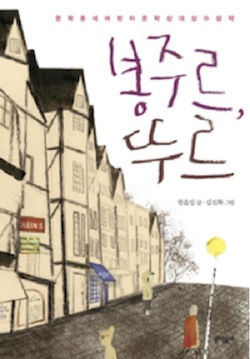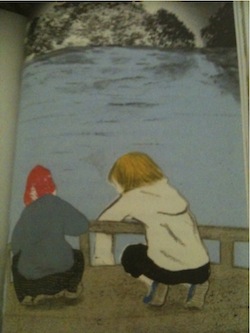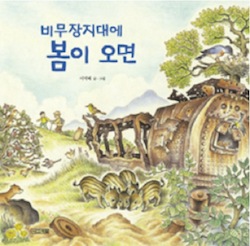Yoo Kyung Sung, University of New Mexico, Albuquerque NM
 This winter, while visiting Seoul, I felt like I a special reporter assigned to a foreign country. While I am there, Seoul amazes me with its advanced technology and great public services that I wish were available to me in the U.S. Korea is busy, young, and somewhat more modern than I remember from my last visit. I go to places where crowds of foreign tourists enthusiastically hang out. People, old and new, meet at Starbucks and other European coffee franchises. They are beloved here. All of it makes me feel like I am in a real city. Watching sophisticated Korean people subtly reminds me that my new home is Albuquerque. I grew up in Korea and married a Korean man from Seoul. Visiting Korea every other year allows me to comprehend the many rapid changes in Seoul. It is my native culture, yet it is no longer home.
This winter, while visiting Seoul, I felt like I a special reporter assigned to a foreign country. While I am there, Seoul amazes me with its advanced technology and great public services that I wish were available to me in the U.S. Korea is busy, young, and somewhat more modern than I remember from my last visit. I go to places where crowds of foreign tourists enthusiastically hang out. People, old and new, meet at Starbucks and other European coffee franchises. They are beloved here. All of it makes me feel like I am in a real city. Watching sophisticated Korean people subtly reminds me that my new home is Albuquerque. I grew up in Korea and married a Korean man from Seoul. Visiting Korea every other year allows me to comprehend the many rapid changes in Seoul. It is my native culture, yet it is no longer home.
Bookstores are also places that I feel and notice changes. Selections in the children’s area as well as the young adult section are growing more rich and creative. Floods of new genres and themes in children’s literature thrill me. I just want to sit down and read them all!
As I reflect on my experiences living in the U.S. I often focus on how Korea is perceived by the many Americans I meet. When I moved to the U.S. about 10 years ago, people often tried to engage me in a conversation based on their knowledge of Korea. All too often Korea is still remembered within the context of the Korean War, fought some sixty years ago. Sometimes, younger adults ask me whether I am from South Korea or North Korea. It is obvious that they don’t recognize the difference. Before my departure on this current trip, I was frustrated with most American’s limited knowledge about Korea and the Korean War. The question, “Which Korea are you from?” seems innocent enough, yet it reveals an ignorance of the politics on the Korean peninsula.
This December’s visit, though, is different than in the past. South and North Korea are on the verge of a major confrontation. A small fishing town near the border was shelled by North Korea artillery resulting in several casualties last month. As I flew to Seoul, one non-Korean passenger referred to it as “war.” I wonder how the U. S. media now describes South Korea? Is it perceived as a dangerous place to visit?
When I think back to my days in school, I recall that North Korea was always the subject of a national propaganda campaign. I grew up watching animations describing a “bad” North Korea. North Korean people were sometimes portrayed as non-human communist “creatures.” Many of the books and materials for children portrayed North Koreans in derogatory and dehumanizing ways. The current population of South Koreans has around 20,660 North Koreans who fled to the south. Perhaps knowing some of these people is why the old propaganda doesn’t faze recent generations.
Two books, Bonjour Tour (2010) by Yoon Sup Hahn and Spring in the DMZ (Demilitarized Zone) (2010) by Uhk Bae Lee depict aspects of Korea’s current political situation — one nation artificially split. In Bonjour Tour, the protagonist, Bon Ju, lives in France. The story begins when Bong Ju moves from Paris to a smaller town, Tour. One day Bon Ju notices a scribble on the side of an old desk. The doodling says, “My beloved country, my beloved Family, I must be alive.” Bong Ju has several theories about the archaic expression. His investigation to find the owner of the scribble becomes a narrative mystery drawing the reader in as he meets new friends in his new school, one of which is a brown-haired Japanese boy, Toshi. Although there are some tensions and misunderstandings involving Toshi’s attitude in the beginning, Bong Ju and Toshi become good friends. Bong Ju later learns that Toshi and his family speak Korean. Bong Ju asks Toshi whether Toshi is Korean, causing much consternation. Later Toshi confesses his secret. His family originated in the Democratic People’s Republic of Korea (DPRK) and managed to move to Japan where they tried to be “Japanese.” (Bong Ju doesn’t understand that DPRK is North Korea’s official name). Toshi’s family left Japan so they could more easily hide their own national identity. Westerners in the book view Asians as one singular group, a perception Toshi and his family try to use to their advantage in France. As Toshi and Bong Ju continue their friendship, Toshi’s family closes their family business, a Japanese restaurant, and leave Tour. The main theme in Bonjour Tour (2010) focuses on the two boys’ divergent Korean national identities. It is clear the author had similar experiences living in France. Her sensitive portrayal was, in some ways, of people like me, Korean Diasporas.
 Bonjour Tour (2010) is a winner of the Moon Hak Dong Neh Children’s Literature Award in Korea. The entire story is narrated from Bong Ju’s twelve-year old perspective. As a South Korean, Bon Ju has a very limited understanding of the North Korean people. What I think is significant is the absence of the propaganda that was so prevalent in my childhood. The friendship between Toshi and Bong Ju is a symbolic portrayal of Korea’s current situation: a nation divided.
Bonjour Tour (2010) is a winner of the Moon Hak Dong Neh Children’s Literature Award in Korea. The entire story is narrated from Bong Ju’s twelve-year old perspective. As a South Korean, Bon Ju has a very limited understanding of the North Korean people. What I think is significant is the absence of the propaganda that was so prevalent in my childhood. The friendship between Toshi and Bong Ju is a symbolic portrayal of Korea’s current situation: a nation divided.
The second book, a picture book Spring in the DMZ (2010), is the second book from the Collaborative International Picture Book Project featuring authors cooperating from the nations of Korea, Japan, and China. In Spring in the DMZ (2010), the north side of the DMZ is the hometown of the protagonist’s grandfather. Periodically the grandfather visits the DMZ tour zone, longing for an actual visit to his hometown located on the other side of the DMZ in North Korea. Paradoxically, the DMZ, a military wasteland, has a variety of rich and biologically diverse natural ecosystems. A large number of animals and botanical species are in danger, but somehow manage to grow in the DMZ. Spring in the DMZ reinforces the strong aspiration that Koreans feel for reunification.
 The political situation between South and North Korea has not been a common topic in Korean children’s literature, but it has been in adult mainstream literature. Even now, I am not certain what young Korean children understand about the current political situation. Books like Bonjour Tour (2010) and Spring in the DMZ (2010) may send powerful invitations to young Koreans to explore their own historically complex cultural identity. Interestingly, it seems that, in some ways, Americans are mirroring Korea’s historical and political journey as Korea seeks to define its national identity.
The political situation between South and North Korea has not been a common topic in Korean children’s literature, but it has been in adult mainstream literature. Even now, I am not certain what young Korean children understand about the current political situation. Books like Bonjour Tour (2010) and Spring in the DMZ (2010) may send powerful invitations to young Koreans to explore their own historically complex cultural identity. Interestingly, it seems that, in some ways, Americans are mirroring Korea’s historical and political journey as Korea seeks to define its national identity.
Journey through Worlds of Words during our open reading hours: Monday-Friday, 9 a.m. to 5 p.m. and Saturday, 9 a.m. to 1 p.m. To view our complete offerings of WOW Currents, please visit archival stream.
- Themes: North Korea, realistic fiction, Yoo Kyung Sung
- Descriptors: Books & Resources, Debates & Trends, Student Connections, WOW Currents

This is an interesting group of books and topic, something that is becoming more and more relevant each day. Most Americans lack any knowledge of countries in the Asian region, and tend to group them all together. These books could be excellent resources to teach young children about the conflict in the Korean Pennisula, and how this is relevant to American political interests. With South Korean becoming more of an American ally, and North Korean developing into more of a threat, Americans need to realize the importance of relations with these two countries.